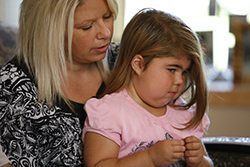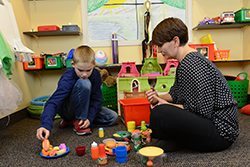Easing Anxiety in Children with Medical Complexities

For many adults, anxiety is a part of life that come with the territory of balancing work, relationships, and personal time. Being able to regularly assess and manage these stressors can help keep anxiety under control, making it imperative to have these management tools in their belt.
It might be easy to forget that many children, specifically those with medical complexities, experience anxieties in certain aspects of their life as well. But by equipping them with the skills to be in control of their emotions, day to day tasks like physical therapy or doctor’s appointments can become more bearable.
Monica Handlos, the clinical social worker at PHS, explains the typical signs of anxiety in children and ways to help a child who displays these behaviors surrounding appointments or procedures.
Signs of anxiety in children
 Children who have experienced a lot of medical care in their life – whether in the form of lab draws, infusions, surgeries, or other appointments that might be painful or uncomfortable – can develop a great amount of uneasiness surrounding these events, with outbursts occurring right before or leading up to the event that triggers this anxiety. Behaviors might include crying, screaming, kicking, bad nightmares, avoidance of the event, temper tantrums that are unexplainable, or an unusual clinginess.
Children who have experienced a lot of medical care in their life – whether in the form of lab draws, infusions, surgeries, or other appointments that might be painful or uncomfortable – can develop a great amount of uneasiness surrounding these events, with outbursts occurring right before or leading up to the event that triggers this anxiety. Behaviors might include crying, screaming, kicking, bad nightmares, avoidance of the event, temper tantrums that are unexplainable, or an unusual clinginess.
Some children might show involuntary signs as well, such as a bright red face, heavy breathing or the feeling that they can’t breathe, or an increase in pulse rate.
Tips for managing anxiety
It’s important to let children know that it’s okay and normal to have anxious feelings about situations that make them scared or uneasy – but it’s also important to know how to cope with these feelings. Here are some tips for helping children learn to manage their anxiety.
- Let your children know that it’s understandable and normal that they don’t like how it feels to know they’re going to be going to an appointment or having a procedure done. But since it isn’t an option to skip, it’s important to know how to handle those feelings to make it easier.
- Teach your child coping skills they can use anywhere, like calm breathing. Show them how to breathe in through the nose and out through the mouth with deep inhales and exhales, pretending they’re smelling a flower and then blowing bubbles.
- Slowly counting to 5 is a good tool they can use independently too – there is an online guided imagery resource available here.
- It’s important to remember that children are really perceptive, and are likely to pick up anxious behaviors they see a parent or caregiver displaying – so being aware of body language and what is being modeled is important to keeping your kiddo calm.
- Be mindful of certain cues or part of a routine that might spark a child’s anxiety – if your child knows the route to your clinic/hospital or what the parking ramp you always go to for appointments looks like, proactively try to help the situation and prepare them.
- If you’re on your way to a stressful appointment or waiting at the clinic, try to do something distracting – talk about future plans, something that makes them laugh, or a topic they enjoy. Many times the anticipation is what creates the most anxiety, so by being able to distract them, they aren’t letting their concerns fester.
- Depending on the individual child, determine how far in advance they should be aware of their appointment – it’s good for children to know what is coming up, but if they will spend the entire time anxious about it, consider how far ahead of time to tell them. Is it hours? Days?
- Don’t avoid things to try and make them easier – it will usually reinforce the fear if it’s something that isn’t or “shouldn’t be” talked about.
- Empathize with your child – often, kids want someone to understand how they’re feeling and need you to know that they think a procedure or appointment hurts and is scary.
Books that help with child anxiety
 Reading books with your child can help open up conversation about what makes them scared or anxious – here are a few books for you and/or your child!
Reading books with your child can help open up conversation about what makes them scared or anxious – here are a few books for you and/or your child!
Considering play therapy
 If you child is still displaying signs of ongoing anxiety despite efforts to develop tools and build skills at home, play therapy is an opportunity for kids to use toys as their words – often providing insight on what is upsetting or stressful in their lives, and how they perceive what is happening.
If you child is still displaying signs of ongoing anxiety despite efforts to develop tools and build skills at home, play therapy is an opportunity for kids to use toys as their words – often providing insight on what is upsetting or stressful in their lives, and how they perceive what is happening.
Monica provides play therapy at the PHS office for kids between the ages of 2-10, giving them to opportunity to use toys as metaphors as they are in total control of their play.
“Children have a hard time saying, ‘I’m mad because of this’ or ‘I’m upset this is happening to me,” explained Monica. “A lot of times, how they interact with you will reflect underlying issues they might need to work through.”
If you think your child could benefit from play therapy, call 651-642-1825 and ask to speak to the clinical social worker.
Originally published: August 19, 2015

